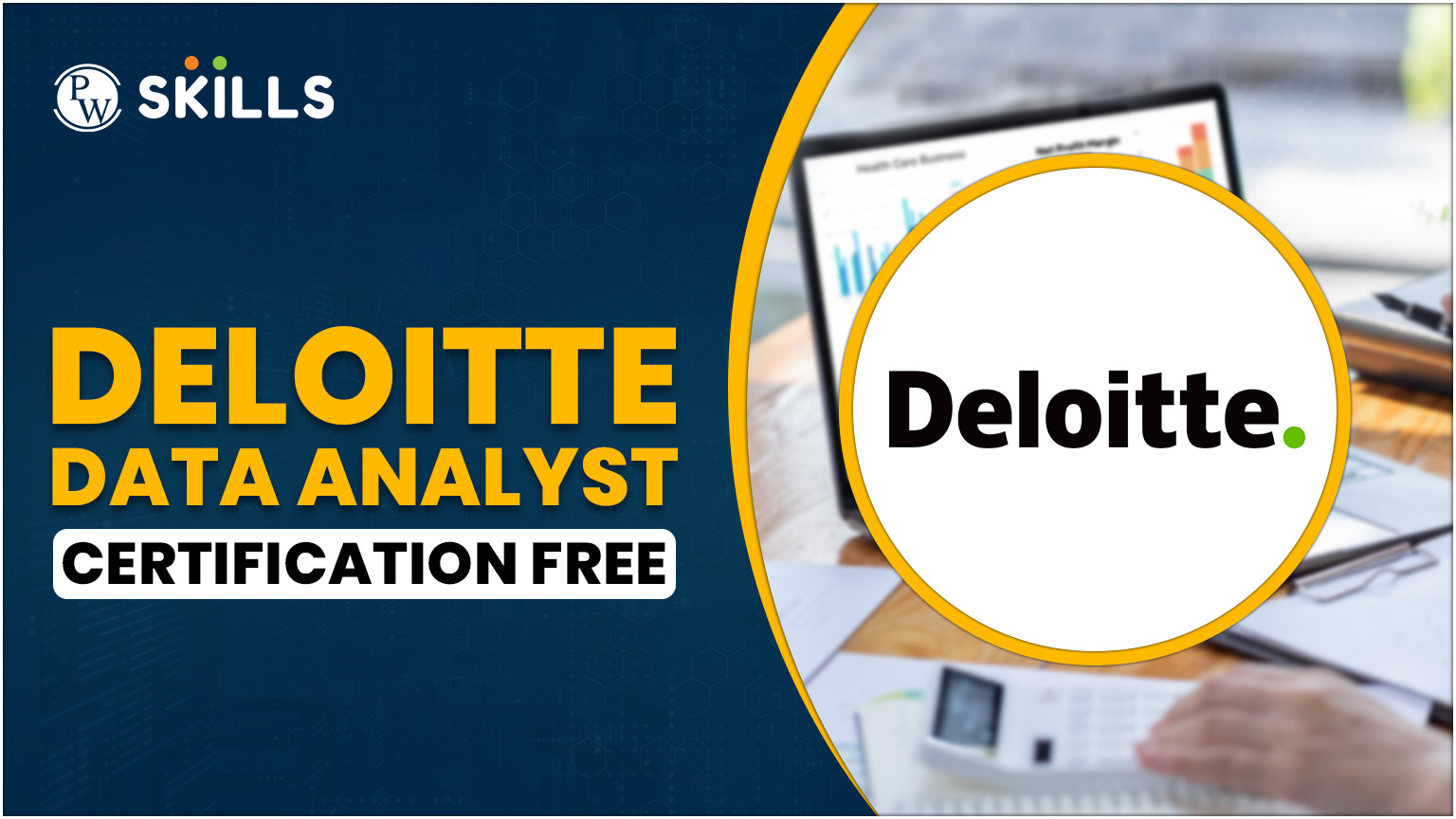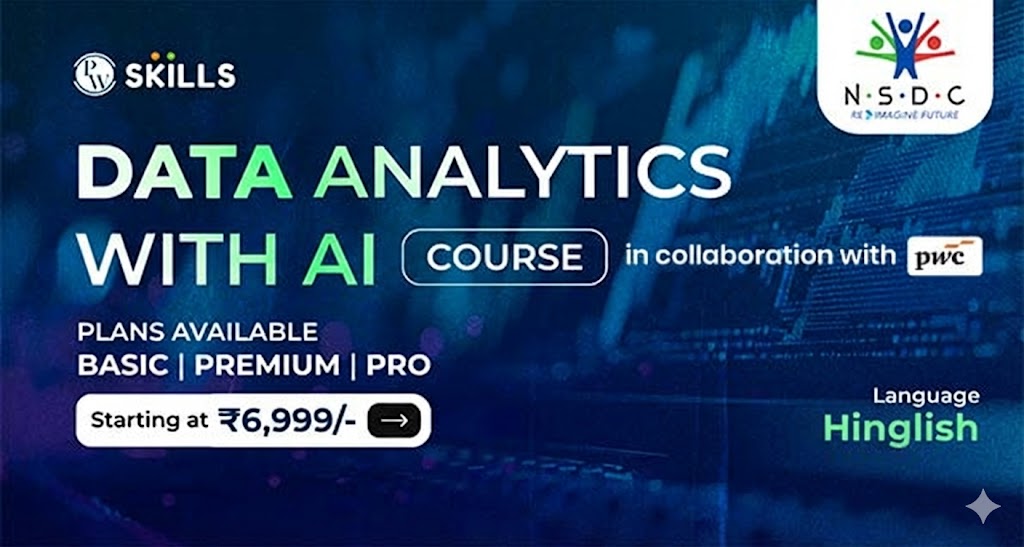A Comprehensive Guide dissimilar from uphauling into data analytics or learning for better job prospects, most people will have heard of the Deloitte Data Analyst Certification Free program. Is it really true, though, that Deloitte actually has free certifications? What other certifications are there that you should consider? And what is Deloitte’s job description for data analysts?

This blog will explore everything you need to know about the Deloitte data analyst certification, free opportunities, alternative certifications, and how to get a job as a data analyst at Deloitte. So let’s dive in!
“Disclaimer: This is informative post, PW Skills will not be responsible in helping or getting internship/job in the mentioned company/org.”
1. Why Should One Choose Deloitte to Develop a Career in Data Analysis?
If you want to embark on or build a career in data analytics, Deloitte is considered an elite within the industry. It offers consultants cutting-edge tech solutions and is globally renowned. For data analysts, this means working on high-impact work across the healthcare, finance, and retail sectors-unparalleled exposure. Compared to smaller consulting firms, this larger clientele means data analysts will handle and analyze diverse datasets to solve real-life problems on a much larger scale.
There are ample opportunities for growth-well-defined training programs such as the Analytics & Cognitive Academy, mentorship from industry leaders, and clear-cut paths of promotion. Deloitte also invests in cutting-edge tools, such as AI and ML, to keep your skill set relevant. Being at the forefront of innovation in the industry, very often you will get to work with new tools and methodologies first-hand.
For those actively applying to Deloitte as data analysts, having that experience on your resume will quickly give you an entry into the job market. Whether or not you decide to stay or move elsewhere, that experience says to potential employers that you have been groomed to exposure and training at the highest tier of industry ability.
![]() Join Our Data Analytics Telegram Channel
Join Our Data Analytics Telegram Channel
![]() Join Our Data Analytics WhatsApp Channel
Join Our Data Analytics WhatsApp Channel
2. Free Learning Resources Provided by Deloitte for Aspiring Data Analysts
Reasons to Choose the Internship Program on Data Analytics by Deloitte-
Deloitte Data Analytics Certification Free,an opportunity for practical work experience at one of the top consulting firms in the world. This self-paced, online internship exposes participants to real-world business problems and allows them to develop data-driven solutions. It serves as a program for honing candidates’ analytical skills in preparation for their future careers in data analytics.
Key Benefits of the Deloitte Free Internship
- Free-of-cost – Totally free for learning purposes.
- Self Paced – Learn according to your own time schedule.
- Certification from the Industry – A certificate will be provided at the end of the course.
- Real-World Tasks – Engage in real business problems.
- Enhances Resume & LinkedIn Profile – Stand out in job applications.
- Open to Freshers and Students – No prior experience needed.
What Will You Learn?
The practical aspect of data analytics is what this learning program by Deloitte Online Training focuses on; the following are some of the key items on the learning agenda:
First Task: Data Analysis
Overview: Create an interactive dashboard in Tableau to analyze telemetry data for a client.
Task Two: Forensic Technology
Overview: Help to investigate unfair pay practices by using data analytics in the forensic investigation.
How Does the Deloitte Virtual Internship Actually Work?
Deloitte’s Free Internship is all virtual and self-paced so that participants can complete it at their convenience. This is how it works:
Enroll Online – Register through the official Deloitte Forage platform.
Watch Pre-Recorded Videos – Learn from the industry experts at Deloitte, Australia.
Do Practical Tasks – Practical tasks related to the marketplace are done, which you learn with.
Receive Sample Solutions – So, you have everything in comparison to the work done by Deloitte professionals.
Earn Certificate – Receive a completion certificate for the internship and show it off on your resume, LinkedIn.
Join our Data Analytics Telegram channel for exclusive updates and tips!
3. Deloitte vs. Other Big 4 Firms: Data Analyst Opportunities Compared
When considering data analyst roles across the Big 4, each firm offers unique advantages. Here’s how Deloitte compares to PwC, EY, and KPMG:
| Aspect | Deloitte | PwC | EY | KPMG |
| Focus Area | Broad analytics across industries | Risk & regulatory focus | AI/automation emphasis | Financial analytics strength |
| Tech Stack | Power BI, Python, Azure | Tableau, Alteryx, AWS | Microsoft stack, NLP tools | Qlik, SAS, Google Cloud |
| Training | Analytics & Cognitive Academy | Digital Badges program | EY Badges learning platform | KPMG Ignition training |
| Client Work | Diverse global projects | Heavy financial services | Emerging tech focus | Audit/risk-heavy projects |
| Career Path | Clear promotion timeline | Flexible specialization | Fast-track options | Structured progression |
Deloitte stands out for its wide industry exposure and strong internal training programs, while other firms may offer deeper specialization in particular sectors or technologies. The best choice depends on whether you prefer breadth (Deloitte) or niche expertise (other Big 4 firms).
4. Skills Required to Become a Data Analyst at Deloitte
Generally, one would need much more than just technical know-how in order to be able to land the data analyst position in Deloitte. Now, going hard skills-wise, you would need very good proficiency with SQL for querying data, advanced analytics through Python or R, and visualization tools such as Power BI or Tableau. These are part of the core toolkit for most projects, whether for cleaning datasets or building executive dashboards.
Deloitte expects that consultants should bridge data to business decisions beyond just technical know-how. Sharp communication skills in interpreting complex results to laymen will augment this and define the ability to weave engaging narratives about data for decision-making purposes. Clients will hear you present work often, so being comfortable with presentation software like PowerPoint and incorporation of clear visualization principles will be critical.
Problem-solving agility would have to be considered: Deloitte’s projects are quite dynamic and would require analysts to always come up with alternative approaches on account of sometimes jumbled data and delving into new requirements. That curious mindset contributes, because the best analysts will not just run the queries, but go beyond and identify patterns that are probably hidden to the rest of the organization. Cultural fit also counts; collaboration skills will make you thrive in Deloitte’s team engagement environment where projects often have members across different departments or offices.
While having these certificates would help, they, however, demonstrate the type of skills Deloitte is looking for-one who integrates technical depth with business acumen. Such successful analysts will think beyond the numbers in trying to understand how the work they are doing affects client strategies and decisions. This is what differentiates the mediocre analysts from those who succeed in Deloitte and advance fast.
5. Future Trends in Data Analytics at Deloitte
Deloitte is making aggressive investments in transformational AI-powered analytics tools for future data roles. Their newest partnerships with AI startups signal an increasing focus on no-code predictive modeling platforms for faster client solution deployment. Testing of generative AI for report writing could well lend itself to entirely changing how analysts spend their time. Cloud analytics on Azure and AWS platforms remain high on the priority list, with Deloitte encouraging upskilling of teams in cloud data engineering.
Recent internal memos from the firm point to three focus areas emerging: real-time analytics for clients on supply chains, ethical AI frameworks targeting businesses regulated by law, and augmented analytics that automatically algorithmically surface insights. Analysts who skill up in those new areas will have an edge. Although SQL and visualization will continue to provide the basics, Deloitte tech leaders expect that within two years’ time, all analysts will require working knowledge of large language models and their applications to the business. That mark of change thus makes continuous learning essential for survival and success at the firm now and way into the future.
Also Read:
- Data Analyst Jobs in Hyderabad: Top 10 Companies Hiring & An Effective Guide
- How Much Do Data Analysts Make? 2025 Data Analysts Salary Guide
- IBM Data Analyst Professional Certificate: A Complete Overview For Data Analyst Enthusiasts
- Google Data Analytics Internship 2025: Application, Eligibility, Skills And Experience
Bonus Resource
Want to be equipped with these high-demand skills? Enroll in the extensive PW Skills Data Analytics Course, where you’ll learn SQL, Python, Power BI, and statistical analysis-the same training Deloitte looks for. For more ambitious students, Deloitte’s advanced Machine Learning and Business Analytics programs are excellent stepping stones to more senior roles. Many of the successful analysts now working in Deloitte started their careers with courses similar to these.
The work involves working with varied clients-from healthcare to finance and therefore, requires coordination across consulting teams. Adaptability is of essence as projects could be changing quickly requiring one to keep learning new tools or industries. If you want variety, problem-solving, and an opportunity to see your inferences impinge on real-world decisions, this could be the right post for you-a data analyst with Deloitte.
Join our Data Analytics Telegram channel for exclusive updates and tips!
Yes Deloitte offers free data analyst certification the link to the page is mentioned in the blog above. Deloitte analysts primarily use SQL, Python/R, Power BI/Tableau, and are increasingly working with AI/ML tools like Azure ML and generative AI platforms. Build a portfolio with real-world projects, complete industry-recognized courses (like PW Skills or Google Analytics), and apply for Deloitte internships or entry-level Business Technology Analyst roles.FAQs
Does Deloitte offer free data analyst certification?
What tools do Deloitte data analysts use?
How can I become a Deloitte data analyst without experience?




